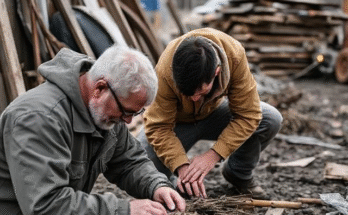Introduction
Have you ever become caught up in a hurricane of thoughts and simply can’t turn off your mind and tap into inner peace? Living life at this hyper-speed pace with our desire for being constantly connected in today’s current world is inducing whirlwind thoughts, never to quiet ourselves long enough to keep pace with inner thoughts.
What the next article suggests to examine is the way conscious awareness can open an inner peace that allows individuals to slow down in these crazy, whirling moments.
Awareness is not just being here; it is the ability to observe our thoughts, feelings, and surroundings without being overwhelmed by them. With mindfulness, we create space between us and the mental chatter that usually dominates our state of mind and behavior.
By doing this aware practice, we can respond to life with purpose rather than react unconsciously, living a deeper sense of peace and meaning.
Understanding Awareness
Awareness is consciously knowing our mind, feelings, and surroundings. Awareness is a mirror that reflects to us our state of mind and feelings and allows us to observe without being engaged in them. Awareness is not the controlling of thoughts but just observing them as they occur and disappear.
Through its power of developing awareness, we come to know ourselves and the patterns that shape our existence. In this heightened state of presence, we are more likely to respond to situations rather than react in the moment.
It establishes emotional equilibrium, increases our ability to make conscious choices, and improves our relationship with the here and now, which leads us ultimately to a more mindful and fulfilling life.
Importance of Awareness
Consciousness is the foundation of personal growth and positive change. Consciousness enables us to understand ourselves, our world, and how what we do influences others. By being conscious, we become capable of making responsible decisions, deepening our relationships, and responding to challenges clearly.
Whether discussing self-awareness, social consciousness, or worldwide consciousness, paying attention to our mind and our surroundings allows us to live with responsibility and with intention. In the hurried world, fostering awareness allows us to be in the here and now, make improved choices, and benefit society.
Moreover, awareness raises emotional intelligence, enabling us to be connected with our feelings and those of others as we empathize.
Awareness provides us with a deeper connection with people and the world, where we can reply with kindness and compassion. We can strengthen our awareness by being reflective and mindful, then develop an integrated, meaningful life.
Cultivating Awareness
Mindfulness Meditation Practice
Mindfulness meditation is maybe the best means of creating awareness. It is a technique of concentrating the mind on a solitary point of reference, for instance, the breath, and guiding the mind back softly every time the mind drifts from the point of reference.
Getting Started: Take a few minutes each day in a peaceful room. Sit comfortably with closed eyes, mindful of the breath. When your mind goes away, mark it and kindly return your mind to the breath.
Online Platforms such as Headspace and Calm provide simple-to-follow beginner-friendly guided meditations.
Apart from relaxation, mindfulness meditation also enhances one’s sensitivity to the higher self. Repeating it helps one acquire the skill of watching emotions and thoughts without being overwhelmed by them.
This makes one emotionally strong, less stressful, and more mentally clear, thus a wonderful technique for personal development.
Journaling for Inner Awareness
Another effective means of raising awareness is journaling. By writing down our emotions and thoughts, it makes them more visible and analyze them logically.
Awareness in Everyday Life
Amid the chaos of life today, we stumble through our days on autopilot—dashing from thing to thing never really being here for what’s going on around us. Yet the cultivation of awareness in daily life can guide us to understanding, peace, and a richer sense of engagement with ourselves and the world at large.
Awareness is the state of being fully in the present moment, observing our thoughts, emotions, and surroundings without judgment. It enables us to let go of unconscious patterns and respond to life’s difficulties with awareness rather than reactivity.
Another means to cultivate awareness is via mindfulness practices such as meditation, slow breathing, or paying attention to become sensitive to plain activities one is engaging in. Eating slowly rather than gobbling the food down, listening intently to what someone else says, or simply listening to the motion of walking can all make a person more firmly established.
Practicing awareness also develops emotional intelligence. By noticing our emotions as they occur, we become sensitive to our inner lives and more capable of managing stress. Awareness also enables us to practice gratitude, as we value the small things in life—sunlight filtering through the window, a loved one’s laughter, or the caress of the breeze on our skin.
Greater awareness can enhance our relationships, too. Listening to people very deeply and perceiving their emotions without distraction and judgment, we build more deeper and richer relationships. Such a presence generates understanding, empathy, and trust and thus strengthens professional and personal relationships.
Consciousness enriches life by allowing us to experience each moment more fully. Through being mindful of what we do on a daily basis, we are able to find a deeper level of peace, sense, and joy on our path in life.

Fostering Inner Peace Through Acceptance
Acceptance is required for peace. When we accept things or emotions as they are, we minimize internal conflict, forming an oasis of peace inside of us.
The Practice of Letting Go: Allow to release that which is not within your control. In releasing, see how a quiet awareness breaks through to free you from unwanted anxiety.
Rather than pushing away the uncertainties in life, permit them to come into being in trust. This heart change allows for deep peace to emerge, which allows you to invite challenge with ease and discernment.
Conclusion
So why not take a few minutes today about being aware? No matter what we practice–mindfulness meditation, journaling, or a simple noticing of the here and now–each step us closer to more mindful and peaceful living.
A second advantage of increasing awareness is it leads to compassion and understanding towards ourselves and other individuals. Understanding our own conundrums and emotions makes us more empathetic with other individuals, which makes us capable of responding to what others are experiencing as opposed to simply reacting in anger or indifference.
This domino effect not only helps us grow as individuals but also helps us bond better with others, building a healthy environment where harmony can prevail.
By implementing these practices in daily life, anybody can create a path to permanent inner peace and change not only themselves but the world around them. After all, when we become peaceful inside, we contribute to the overall harmony of the world around us.



